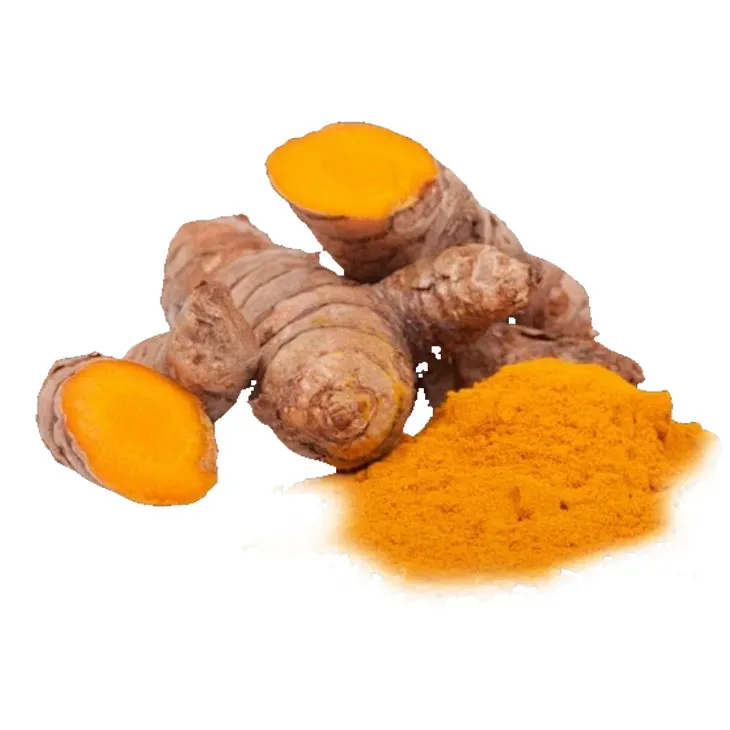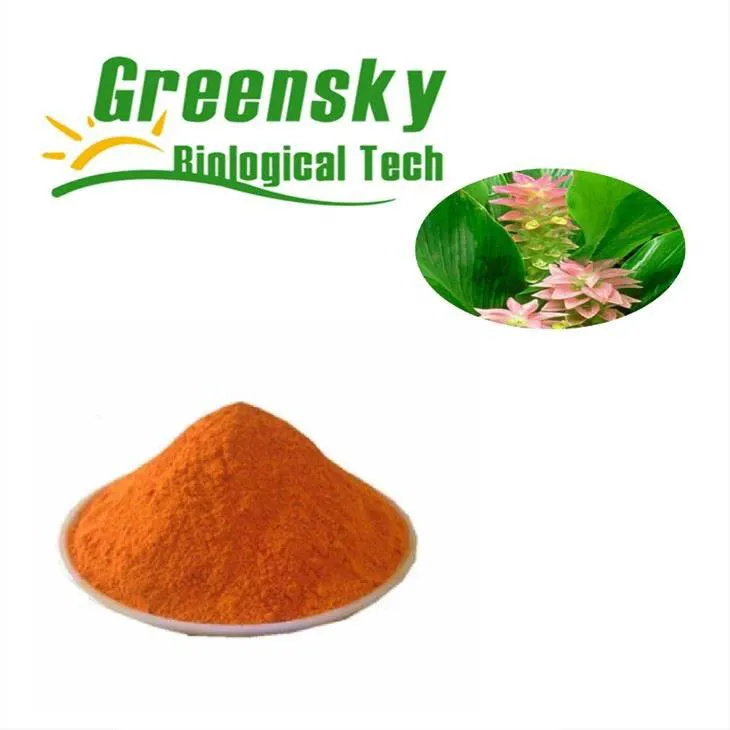- 0086-571-85302990
- sales@greenskybio.com
Regarding Curcumin: The Anti - inflammatory King from Natural Turmeric.
2024-12-20

1. Introduction to Curcumin
Curcumin is a compound that is derived from turmeric, a common spice that has been an integral part of traditional medicine for centuries. Turmeric, with its bright yellow color, is not only used to add flavor and color to food but also holds within it a compound that has caught the attention of the scientific community - Curcumin. This compound has emerged as a powerful anti - inflammatory agent, with properties that are being continuously explored and discovered.

2. The Origins and Traditional Use of Turmeric
Turmeric has a long history of use in traditional medicine systems around the world. In Ayurvedic medicine, which has its roots in India, turmeric has been used for thousands of years. It was used to treat a variety of ailments, including digestive issues, skin problems, and joint pain. In traditional Chinese medicine, turmeric was also recognized for its medicinal properties. The fact that turmeric has been used for such a long time in different cultures is a testament to its potential health benefits.

3. How Curcumin Works as an Anti - Inflammatory Agent
3.1 Targeting Multiple Inflammatory Pathways
One of the most remarkable aspects of curcumin is its ability to target multiple inflammatory pathways in the body. Inflammation is a complex biological process that involves various signaling molecules and cellular mechanisms. Curcumin can interfere with these processes at different levels. For example, it can modulate the activity of cytokines, which are small proteins that play a crucial role in inflammation. By reducing the production of pro - inflammatory cytokines and increasing the production of anti - inflammatory cytokines, curcumin helps to balance the inflammatory response in the body.
3.2 Inhibiting Enzymes Involved in Inflammation
Curcumin can also inhibit certain enzymes that are involved in the inflammatory process. For instance, it has been shown to inhibit cyclooxygenase - 2 (COX - 2), an enzyme that is responsible for the production of prostaglandins, which are lipid compounds that contribute to inflammation and pain. By inhibiting COX - 2, curcumin can reduce pain and inflammation. Additionally, curcumin can inhibit other enzymes such as lipoxygenase, which is also involved in the production of inflammatory mediators.
4. The Efficacy of Curcumin in Inflammatory Conditions
4.1 Reducing Inflammation - Related Pain
Studies have demonstrated that curcumin can be effective in reducing inflammation - related pain. For patients with conditions such as arthritis, which is characterized by joint inflammation and pain, curcumin has shown promise. It can help to relieve the pain associated with arthritis by reducing the inflammation in the joints. In addition to arthritis, curcumin may also be beneficial for other types of pain that are caused by inflammation, such as muscle pain or back pain.
4.2 Improving Joint Health
Curcumin has significant implications for joint health. In addition to reducing pain, it can also help to improve the function of joints. It can protect the cartilage in the joints from damage and degradation. Cartilage is a connective tissue that provides cushioning and support to the joints. By preventing the breakdown of cartilage, curcumin can help to maintain the integrity of the joints and improve their mobility. This is particularly important for individuals with joint disorders such as osteoarthritis or rheumatoid arthritis.
4.3 Preventing Chronic Diseases Associated with Inflammation
Chronic inflammation is associated with a variety of diseases, including heart disease, diabetes, and certain types of cancer. Curcumin may play a role in preventing these diseases by reducing chronic inflammation in the body. For example, in the case of heart disease, inflammation in the blood vessels can lead to the development of atherosclerosis, which is the buildup of plaque in the arteries. Curcumin can help to reduce this inflammation and potentially prevent the progression of atherosclerosis. In diabetes, inflammation can affect insulin sensitivity, and curcumin may help to improve insulin sensitivity by reducing inflammation. In cancer, inflammation can create an environment that promotes tumor growth, and curcumin may have anti - cancer properties by reducing this inflammation.
5. Curcumin as a Safer Alternative to Synthetic Anti - inflammatory Drugs
Many synthetic anti - inflammatory drugs, such as non - steroidal anti - inflammatory drugs (NSAIDs), are commonly used to treat inflammation. However, these drugs can have side effects. For example, long - term use of NSAIDs can cause gastrointestinal problems, including ulcers and bleeding. In contrast, curcumin, being a natural compound, may present a potentially safer alternative. While curcumin is generally well - tolerated, it is important to note that it may also have some mild side effects in some individuals, such as digestive discomfort. However, these side effects are usually less severe compared to those of synthetic anti - inflammatory drugs.

6. Challenges in Using Curcumin
6.1 Bioavailability
One of the main challenges in using curcumin is its low bioavailability. Bioavailability refers to the proportion of a drug or compound that enters the circulation and is able to have an active effect on the body. Curcumin has poor solubility in water, which can limit its absorption in the body. As a result, a large amount of curcumin may pass through the digestive system without being fully absorbed. To overcome this issue, various methods have been developed, such as formulating curcumin with other substances to improve its solubility and absorption.
6.2 Standardization
Another challenge is the lack of standardization in curcumin products. Since curcumin is available in various forms, such as supplements and extracts, it can be difficult to ensure that the products contain a consistent amount of curcumin. Different manufacturers may use different extraction methods and quality control measures, which can lead to variability in the potency of curcumin products. This makes it challenging for consumers to know exactly what they are getting when they purchase a curcumin product.7. Future Directions for Curcumin Research
7.1 Improving Bioavailability
Future research on curcumin should focus on further improving its bioavailability. Scientists are exploring new ways to formulate curcumin to make it more easily absorbed by the body. This could involve developing new delivery systems, such as nanoparticles or liposomes, which can protect curcumin from degradation in the digestive system and enhance its absorption. By improving bioavailability, the effectiveness of curcumin as an anti - inflammatory agent could be significantly enhanced.
7.2 Clinical Trials
More clinical trials are needed to fully understand the potential benefits of curcumin in different inflammatory conditions. While there have been some promising pre - clinical and small - scale clinical studies, larger and more comprehensive clinical trials are required to confirm the efficacy and safety of curcumin. These trials should be designed to evaluate curcumin's effectiveness in comparison to existing anti - inflammatory treatments, as well as to determine the optimal dosage and treatment duration.
7.3 Exploring Additional Health Benefits
In addition to its anti - inflammatory properties, curcumin may have other potential health benefits that have not yet been fully explored. For example, there is some evidence to suggest that curcumin may have antioxidant, neuroprotective, and antimicrobial properties. Future research should aim to further investigate these potential benefits and determine how curcumin can be used to promote overall health.8. Conclusion
Curcumin, the compound derived from natural turmeric, is a powerful anti - inflammatory agent with a wide range of potential health benefits. It can target multiple inflammatory pathways, reduce inflammation - related pain, improve joint health, and may have implications in preventing chronic diseases associated with inflammation. Although there are challenges in using curcumin, such as low bioavailability and lack of standardization, future research holds great promise in overcoming these issues and further exploring the potential of this remarkable compound. As a potentially safer alternative to synthetic anti - inflammatory drugs, curcumin has the potential to make a significant contribution to the field of health and medicine.
FAQ:
What is curcumin?
Curcumin is a compound that is derived from turmeric, which is a common spice. It has been found to have powerful anti - inflammatory properties.
How does curcumin act as an anti - inflammatory?
Curcumin can target multiple inflammatory pathways in the body. This means it can interfere with the processes that cause inflammation, thus reducing inflammation and potentially providing relief for various inflammatory conditions.
What are the benefits of curcumin in relation to joint health?
Studies have shown that curcumin is effective in improving joint health. It can reduce inflammation - related pain in the joints, which may be beneficial for people with joint problems such as arthritis.
Can curcumin help prevent chronic diseases?
There are implications that curcumin may be helpful in preventing chronic diseases associated with inflammation. However, more research is still needed to fully understand this aspect.
How does curcumin compare to synthetic anti - inflammatory drugs?
Since curcumin has a natural origin, it may present a potentially safer alternative to some synthetic anti - inflammatory drugs. Synthetic drugs may have more side effects, while curcumin, being natural, may be better tolerated in some cases, but it also may not be as potent in all situations.
Related literature
- The Anti - Inflammatory Effects of Curcumin in Health and Disease"
- "Curcumin: A Promising Anti - Inflammatory Agent for Chronic Diseases"
- "Turmeric and Curcumin: Biological Actions and Medicinal Applications"
- ▶ Hesperidin
- ▶ Citrus Bioflavonoids
- ▶ Plant Extract
- ▶ lycopene
- ▶ Diosmin
- ▶ Grape seed extract
- ▶ Sea buckthorn Juice Powder
- ▶ Fruit Juice Powder
- ▶ Hops Extract
- ▶ Artichoke Extract
- ▶ Mushroom extract
- ▶ Astaxanthin
- ▶ Green Tea Extract
- ▶ Curcumin
- ▶ Horse Chestnut Extract
- ▶ Other Product
- ▶ Boswellia Serrata Extract
- ▶ Resveratrol
- ▶ Marigold Extract
- ▶ Grape Leaf Extract
- ▶ New Product
- ▶ Aminolevulinic acid
- ▶ Cranberry Extract
- ▶ Red Yeast Rice
- ▶ Red Wine Extract
-
Lemon Extract
2024-12-20
-
Polygonum multiflorum extract
2024-12-20
-
Buckthorn bark extract
2024-12-20
-
Oat Straw Extract Powder
2024-12-20
-
Lily extract
2024-12-20
-
Hawthorn powder
2024-12-20
-
Fenugreek Extract Powder
2024-12-20
-
Aguaje Extract
2024-12-20
-
Cat Claw Extract
2024-12-20
-
Bayberry Extract
2024-12-20





















